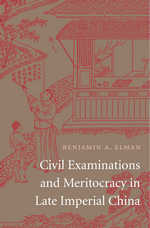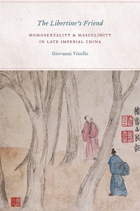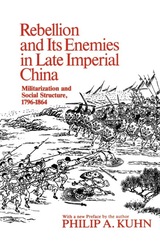
Christianity is often praised as an agent of Chinese modernization or damned as a form of cultural and religious imperialism. In both cases, Christianity’s foreignness and the social isolation of converts have dominated this debate. Eugenio Menegon uncovers another story. In the sixteenth century, European missionaries brought a foreign and global religion to China. Converts then transformed this new religion into a local one over the course of the next three centuries.
Focusing on the still-active Catholic communities of Fuan county in northeast Fujian, this project addresses three main questions. Why did people convert? How did converts and missionaries transform a global and foreign religion into a local religion? What does Christianity’s localization in Fuan tell us about the relationship between late imperial Chinese society and religion?
Based on an impressive array of sources from Asia and Europe, this pathbreaking book reframes our understanding of Christian missions in Chinese-Western relations. The study’s implications extend beyond the issue of Christianity in China to the wider fields of religious and social history and the early modern history of global intercultural relations. The book suggests that Christianity became part of a preexisting pluralistic, local religious space, and argues that we have so far underestimated late imperial society’s tolerance for “heterodoxy.” The view from Fuan offers an original account of how a locality created its own religious culture in Ming-Qing China within a context both global and local, and illuminates the historical dynamics contributing to the remarkable growth of Christian communities in present-day China.

During China's late imperial period (roughly 1400-1900 CE), men would gather by the millions every two or three years outside official examination compounds sprinkled across China. Only one percent of candidates would complete the academic regimen that would earn them a post in the administrative bureaucracy. Civil Examinations assesses the role of education, examination, and China's civil service in fostering the world's first professional class based on demonstrated knowledge and skill.
While millions of men dreamed of the worldly advancement an imperial education promised, many more wondered what went on inside the prestigious walled-off examination compounds. As Benjamin A. Elman reveals, what occurred was the weaving of a complex social web. Civil examinations had been instituted in China as early as the seventh century CE, but in the Ming and Qing eras they were the nexus linking the intellectual, political, and economic life of imperial China. Local elites and members of the court sought to influence how the government regulated the classical curriculum and selected civil officials. As a guarantor of educational merit, civil examinations served to tie the dynasty to the privileged gentry and literati classes--both ideologically and institutionally.
China did away with its classical examination system in 1905. But this carefully balanced and constantly contested piece of social engineering, worked out over the course of centuries, was an early harbinger of the meritocratic regime of college boards and other entrance exams that undergirds higher education in much of the world today.

This book documents an Islamic–Confucian school of scholarship that flourished, mostly in the Yangzi Delta, in the seventeenth and eighteenth centuries. Drawing on previously unstudied materials, it reconstructs the network of Muslim scholars responsible for the creation and circulation of a large corpus of Chinese Islamic written material—the so-called Han Kitab. Against the backdrop of the rise of the Manchu Qing dynasty, The Dao of Muhammad shows how the creation of this corpus, and of the scholarly network that supported it, arose in a context of intense dialogue between Muslim scholars, their Confucian social context, and China’s imperial rulers.
Overturning the idea that participation in Confucian culture necessitated the obliteration of all other identities, this book offers insight into the world of a group of scholars who felt that their study of the Islamic classics constituted a rightful “school” within the Confucian intellectual landscape. These men were not the first Muslims to master the Chinese Classics. But they were the first to express themselves specifically as Chinese Muslims and to generate foundation myths that made sense of their place both within Islam and within Chinese culture.

In this study of desire in Late Imperial China, Martin W. Huang argues that the development of traditional Chinese fiction as a narrative genre was closely related to changes in conceptions of the fundamental nature of desire. He further suggests that the rise of vernacular fiction during the late Ming dynasty should be studied in the context of contemporary debates on desire, along with the new and complex views that emerged from those debates.
Desire and Fictional Narrative in Late Imperial China shows that the obsession of authors with individual desire is an essential quality that defines traditional Chinese fiction as a narrative genre. Thus the maturation of the genre can best be appreciated in terms of its increasingly sophisticated exploration of the phenomenon of desire.



Mount Tai in northeastern China has long been a sacred site. Indeed, it epitomizes China’s religious and social diversity. Throughout history, it has been a magnet for both women and men from all classes—emperors, aristocrats, officials, literati, and villagers. For much of the past millennium, however, the vast majority of pilgrims were illiterate peasants who came to pray for their deceased ancestors, as well as for sons, good fortune, and health.
Each of these social groups approached Mount Tai with different expectations. Each group’s or individual’s view of the world, interpersonal relationships, and ultimate goals or dreams—in a word, its identity—was reflected in its interactions with this sacred site. This book examines the behavior of those who made the pilgrimage to Mount Tai and their interpretations of its sacrality and history, as a means of better understanding their identities and mentalities. It is the first to trace the social landscape of Mount Tai, to examine the mindsets not just of prosperous, male literati but also of women and illiterate pilgrims, and to combine evidence from fiction, poetry, travel literature, and official records with the findings of studies of material culture and anthropology.

Rulin waishi (The Unofficial History of the Scholars) is more than a landmark in the history of the Chinese novel. This eighteenth-century work, which was deeply embedded in the intellectual and literary discourses of its time, challenges the reader to come to grips with the mid-Qing debates over ritual and ritualism, and the construction of history, narrative, and lyricism. Wu Jingzi's (1701–54) ironic portrait of literati life was unprecedented in its comprehensive treatment of the degeneration of mores, the predicaments of official institutions, and the Confucian elite's futile struggle to reassert moral and cultural authority. Like many of his fellow literati, Wu found the vernacular novel an expressive and malleable medium for discussing elite concerns.
Through a close reading of Rulin waishi, Shang Wei seeks to answer such questions as What accounts for the literati's enthusiasm for writing and reading novels? Does this enthusiasm bespeak a conscious effort to develop a community of critical discourse outside the official world? Why did literati authors eschew publication? What are the bases for their social and cultural criticisms? How far do their criticisms go, given the authors' alleged Confucianism? And if literati authors were interested solely in recovering moral and cultural hegemony for their class, how can we explain the irony found in their works?

This well-documented study discusses the social and economic changes in Shandong province before the influence of the West was felt at the end of the nineteenth century. The authors show that by the sixteenth century, commercial and handicraft towns linked to national and local markets had already begun to emerge. Urban growth was made possible by increased agricultural production, which in turn stimulated specialization and increased commercialization in the agricultural sector. Another important change in rural society at this time was the emergence of a new stratum of wealthy landlords who managed their estates with wage labor. Case studies of managerial landlords, who form the main focus of this study, are included as well as generalizations drawn from questionnaire materials.
Jing Su and Luo Lun wrote this book while they were young researchers at Shandong University in the late 1950s, using data they had gathered in the culturally relaxed period of the Hundred Flowers. In his Introduction, Endymion Wilkinson analyzes the authors’ thesis and concludes that their Leninist model is inapplicable to premodern Chinese history. The value of this study lies not so much in its conclusion that even without the impact of Western imperialism China would of itself have developed a capitalist society, but rather in the wealth of data the authors present, in this first in-depth study of a relatively advanced region in north China.

Delving into three hundred years of Chinese literature, from the mid-sixteenth century to the mid-nineteenth, The Libertine’s Friend uncovers the complex and fascinating history of male homosexual and homosocial relations in the late imperial era. Drawing particularly on overlooked works of pornographic fiction, Giovanni Vitiello offers a frank exploration of the importance of same-sex love and eroticism to the evolution of masculinity in China.
Vitiello’s story unfolds chronologically, beginning with the earliest sources on homoeroticism in pre-imperial China and concluding with a look at developments in the twentieth century. Along the way, he identifies a number of recurring characters—for example, the libertine scholar, the chivalric hero, and the lustful monk—and sheds light on a set of key issues, including the social and legal boundaries that regulated sex between men, the rise of male prostitution, and the aesthetics of male beauty. Drawing on this trove of material, Vitiello presents a historical outline of changing notions of male homosexuality in China, revealing the integral part that same-sex desire has played in its culture.



This book examines the widespread practice of self-publishing by writers in late imperial China, focusing on the relationships between manuscript tradition and print convention, peer patronage and popular fame, and gift exchange and commercial transactions in textual production and circulation.
Combining approaches from various disciplines, such as history of the book, literary criticism, and bibliographical and textual studies, Suyoung Son reconstructs the publishing practices of two seventeenth-century literati-cum-publishers, Zhang Chao in Yangzhou and Wang Zhuo in Hangzhou, and explores the ramifications of these practices on eighteenth-century censorship campaigns in Qing China and Chosŏn Korea. By giving due weight to the writers as active agents in increasing the influence of print, this book underscores the contingent nature of print’s effect and its role in establishing the textual authority that the literati community, commercial book market, and imperial authorities competed to claim in late imperial China.
READERS
Browse our collection.
PUBLISHERS
See BiblioVault's publisher services.
STUDENT SERVICES
Files for college accessibility offices.
UChicago Accessibility Resources
home | accessibility | search | about | contact us
BiblioVault ® 2001 - 2024
The University of Chicago Press









